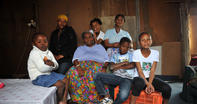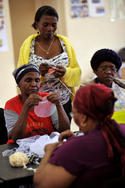Beauty Skefile

My parents were not cruel to us but they did not show much interest in us. I can't say why not, but they drank a lot on weekends and, you know, when you are drinking, you get nothing right.
Their friends came to our house on weekends. One of them wound up the gramophone and they all danced, getting drunk and laughing a lot together, having a little party. I never drank any wine or beer at all, myself. So we didn't talk to our parents very much about what we were doing and we didn't argue with them.
We just respected and obeyed them. Nobody was checking up on me. I only went home to eat, then I went out to do whatever I wanted to do.
My friends and I always got together after school to fool around, just talking and laughing. We were not doing anything bad but were not doing anything good, either. We were not like the kids of today. They know all these things from a young age. They are too clever.
Tenjiwe Tutu

My mother was very strong and, when we were young, she did all the duties in our home and fields herself. She ploughed the land to grow our vegetables, collected our drinking water, gathered the wood, made the fire and cooked our food.
She even plastered the walls of our rondavel with mud and cow dung, combined to just the right mixture so that the walls would last. Her garden was lovely. I still remember the cabbages, potatoes and carrots she grew. My mother was very gentle with her children, but if we didn't listen she got cross and gave us a hiding.
My mother needed money for clothes, school books and other things for her children, so she decided to go to Cape Town to look for my father. I was seven or eight when she went. She waved to us as the bus drove away and we carried on waving until it was a speck in the distance, as children do.
When we turned around to walk back without her, our hearts were heavy and all three of us were crying. Your mommy may have nothing much to give you, but you still do not want to lose her. Oh, that was a sad time.
Goldie Qayiya

It was my father who made the important decisions for me, ignoring my own desires, and his decisions determined the course of my life. Things turned out alright in the end, but I experienced some terrible difficulties. And the fact that I could not choose my own life's path has caused me pain.
My father never stopped working and I never saw him get tired, although he never slept for long. My mother was a very quiet person, but I never answered her back because we were taught, 'A child is a child and must respect an adult.' If she said, 'Goldie, go and take food to your little brothers and sisters'. I did it. Not once did I say, 'No, I don't feel like it,' or 'I am tired.' Adults, in their wisdom, were to be respected.
By Jo-Anne Smetherham